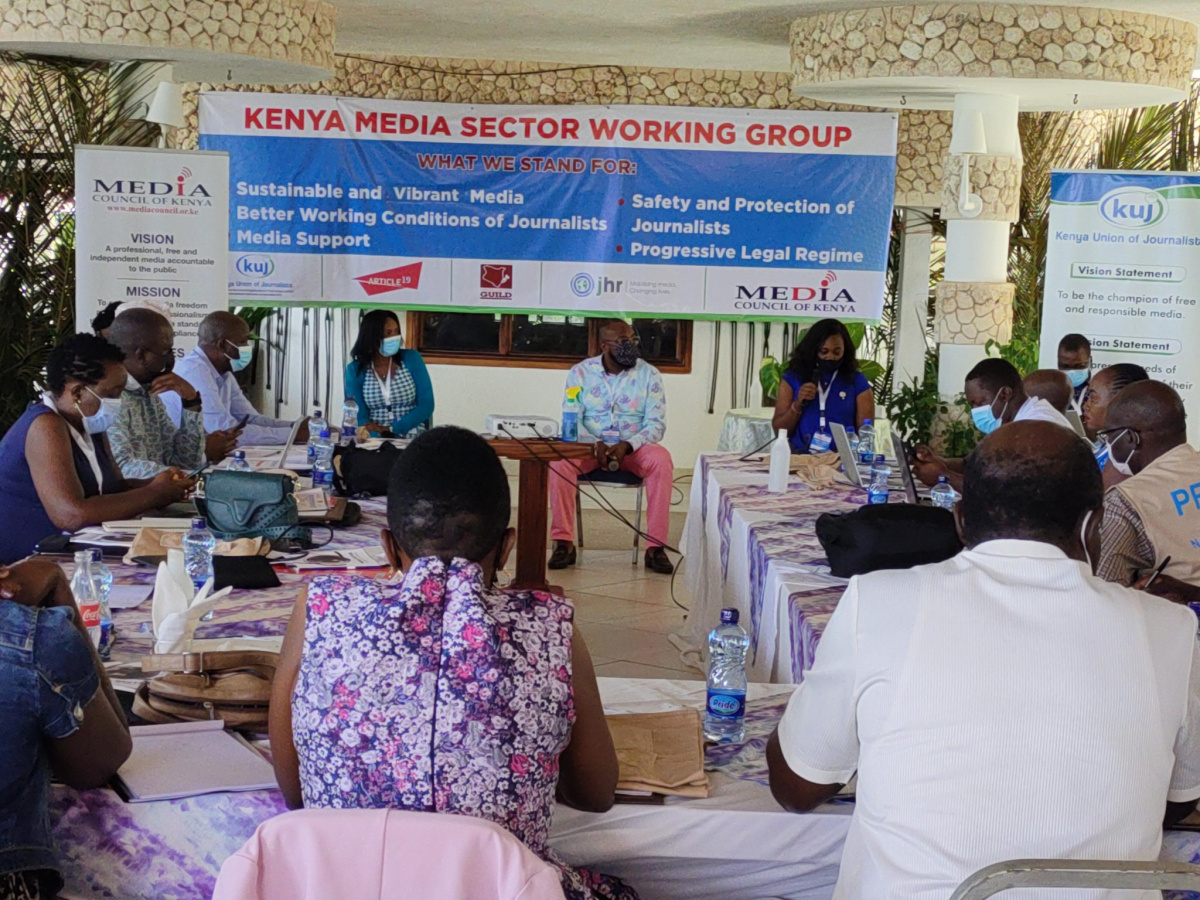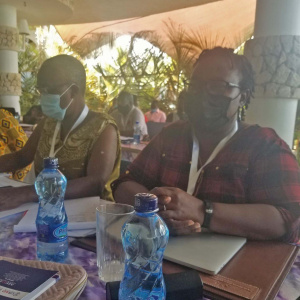Kenya media sector working group tackles sexual harassment, regulation and elections
IAWRT Kenya members joined the discussion on media sustainability in Kenya
A meeting of the Kenya Media Sector Working Group conference was held on July 3, 2021 to discuss critical matters affecting the media industry with an aim of influencing policy on media sustainability.
The previous meeting by the Kenya Media Sector Working Group in March this year led to the development of a 13-point statement that was named the Maanzoni Declaration. The July meeting is said to be a follow-up to the Maanzoni Declaration.
“The journey to the Media Sustainability Convention was informed by the Covid-19 crisis in 2020. This forum hopes to come up with a policy document to influence law on the establishment of a Media Sustainability Fund,” said Rosalia Omungo, editor of Kenya Editors Guild.
The gathering discussed having sustainable and vibrant media, better working conditions for journalists, media support, safety and protection of journalists, and having a progressive legal regime.
“Journalists are the key resources that media houses need to survive and consequently, the needs of journalists must be addressed even in a challenging financial or economic environment,” said Faith Oneya, editor at Nation Media Group.

Sexual harassment in the workplace
Glaring gaps on sexual harassment policies in media houses, Media Complaints Commission, and code of ethics are a hindrance to mitigating sexual harassment in the media, said Dorothy Njoroge, the chair at Association of Media Women in Kenya.
She stated that the culture within most Kenyan media newsrooms is largely masculine.
“Culture change is a gap and needs to be addressed,” said Njoroge.
The process of addressing complaints within the Media Council of Kenya (MCK) Complaints Commission is clear, however, addressing sexual harassment is complex.
“We should prioritise the need to ensure we have safe spaces,” said Dinah Ondari of the Media Council of Kenya.
Policies must be fit for purpose when it comes to having sexual harassment policies in media houses, she said.
Kenya media regulation and accreditation in the 21st century
Should there be more or less regulation and accreditation? A panel discussion tried to answer the question.
Nelly Mululuka of the Kenya Film Classification Board (KFCB) said of the role and mandate of the organization: like a watchman dealing with media owners, journalists, content consumers, advertisers among other stakeholders.
“Freedom of expression is there but it cannot be absolute. It must be exercised responsibly,” she stressed.
With that, KFCB has to filter through the content to ensure it is the right content and that the law has to be enforced.
Governance specialist Henry Maina said functional overreach or overlap among the regulators KFCB and Communications Authority of Kenya must be reviewed. He said regulation is important in two phases: order and economic reasons.
“The laws need to be harmonised to co-relate with the 21st Century,” Maina said.
MCK CEO David Omwoyo said, “We need to have a framework where the code of conduct and practice of journalists in Kenya is about qualified people… The code of ethics is the ultimate Bible or Koran to journalists. It must be a privilege to audit.”
“It is time to review the media regulations in this country so that they are aligned to the transformations taking place in the industry. Key among the changes in the industry is convergence,” said Dr. Nancy Booker of the Aga Khan University Graduate School of Media and Communications. She moderated the discussion.
2022 General Elections in Kenya
Kenya Correspondents Association Chair Oloo Janak spoke about the need for the media to prepare adequately for the 2022 General Elections.
The meeting spoke with key officials on the emerging (or recurring) issues in the country such as election management, election offences, and ethical leadership.
The Independent Electoral and Boundaries (IEBC) said media has a role to play in civic education on voter registration as they target two major mass registrations targeting four million young people with funds now being available.
“The Commission will work with the media to enhance the transparency of electoral processes and ensure accountability of election results from polling stations,” said IEBC Commission chair Wafula Chebukati.
“As we get into elections next year, the media should contribute to the vetting of candidates for various positions, similar to what government agencies do,” Ethics and Anti-Corruption Commission (EACC) CEO Twalib Mbarak.
He also said Kenya’s media industry has remained a key player in the governance affairs of the country.
The EACC is the premiere agency to fight corruption and was established under the Ethics & Anti-Corruption Act 2011.
The IEBC, EACC, and Office of the Director of Public Prosecutions made a commitment to work with the media by having synergies in disseminating accurate information to the citizens








